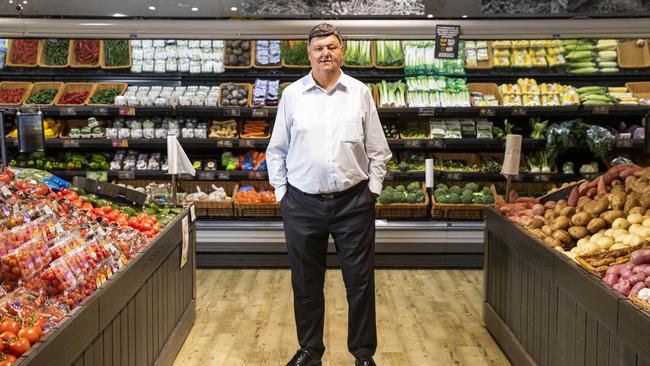Ritchies boss eyes ‘two speed’ grocery market as economic pressures build
A ‘two speed’ market has emerged, says Richies boss Fred Harrison, as some shoppers fill their baskets with home brands while cashed-up households splash out on pricier goods.

The boss of one of the nation’s largest network of independent supermarkets believes a ‘two speed’ market is growing as some shoppers fill their baskets with home brands and discounted items while more cash-rich households pick up pricier groceries and more expensive cuts of meat.
Rising interest rates and the soaring cost of living remain the biggest culprit in the bifurcation of the $135bn supermarket space, driving a wedge between lower income and higher income households, although overall the outlook for Christmas remains good as long as the RBA doesn’t raise interest rates again in December.
Fred Harrison, the chief executive of Ritchies which has 79 supermarkets through Victoria, NSW and Queensland, is also still very concerned about the plague of illegal and smuggled tobacco as well as vapes being sold throughout Australia which has seen his cigarette sales collapse by around 16 per cent over the last 12 months.
Mr Harrison told The Australian that just in the last few months as many as 20 tobacco and vape stores had opened near his supermarkets. This was robbing independent supermarkets of sales, government of taxes and also has led to a major outbreak of violence such as fire bombing of smokes stores and shootings as organised crime gangs fight over territories and the vast profits up for grabs in illegal tobacco.
Independent supermarkets like Ritchies typically have an over-indexed proportion of tobacco sales, and Mr Harrison said the impact of illegal tobacco and vapes had knocked around 3 per cent growth off his stores to see his store sales growing at around 1 per cent.
“Tobacco, as far as sales go, the decreases have never been as big as we’ve seen today, we are seeing tobacco down 16 to 18 per cent down on 12 months ago which was 15 per cent down on the previous 12 months. It is huge,” Mr Harrison told The Australian.
“It is illicit tobacco, smuggled in from the border, vapes, chop chop and I would say we have had 20 to 30 tobacconists open around our stores this year and we all know what is going on.”
Mr Harrison said Ritchies sales were up 4 per cent in terms of food and groceries but with tobacco his total sales were almost flat. “We are finding that tobacco is almost taking 3 per cent off our top line.”
Ritchies latest accounts lodged with the regulator showed total sales for 2023 fell slightly to $1.34bn as net profit fell around 15 per cent to $37.6m. Its sales have almost doubled in the last 10 years. Ritchies is one of the largest groupings of independent supermarkets in Australia and conducts its wholesale business with Metcash. Metcash has a stake of just under 30 per cent in the independent supermarket operator.
Mr Harrison said over the last 12 months there was a chasm opening up between lower income and more affluent households that had showed up in food and grocery sales at his chains and in particular the type of products going into shopping baskets.
“We have been spending a lot of time discussing this in the last two weeks, we are almost seeing a two-paced business where demographics in the mortgage belts, younger families, we are seeing sales struggle and people spend a lot more on home brands.”
Ritchies had recently put 100 key grocery lines on a new, lower price setting to match discounters such as Aldi and this had triggered a 100 per cent spike in sales for those items on promotion over four weeks.
“We are seeing people really look for value, especially in staples. They aren’t necessarily buying luxury items and they are spending more on promotional items.”
At some of its other stores however, where household incomes were higher, there was more demand for higher prices food and groceries.
“But in some of our more premium stores the demographic is stronger, more retirees with disposable income, and we are not seeing necessarily the same impact, in fact we are seeing more buoyant sales and luxury goods are doing well.
“Here for example our meat business is going from strength to strength, cuts like porterhouse, T-bone, rump and eye fillet, those sales are remaining strong.
“So it’s a mixed speed out there.”
He said in its outer suburban chains shoppers were shopping for cheaper groceries while in regional areas there was more money directed to more premium items.
He said he remained optimistic about Christmas although much would depend on the interest rates setting.
“We are optimistic about Christmas, people tend to spoil themselves in January, they then tighten their belts from February onwards.”
.




To join the conversation, please log in. Don't have an account? Register
Join the conversation, you are commenting as Logout